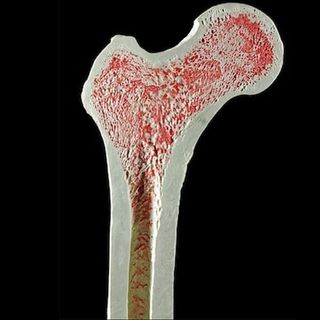Mammal bones are negatively impacted by eating fewer calories, and especially by the combination of exercise and calorie restriction, according to new research published in theJournal of Bone and Mineral Research. While the research was carried out on mice and does not immediately translate to human bodies, it paves the way for more research on the effects of diet and exercise culture, and the harm it can do to human bodies.
“These findings were somewhat of a surprise for us,” lead author Maya Styner said in a statement. “Past studies in mice have shown us that exercise paired with a normal calorie diet, and even a high-calorie diet, is good for bone health. Now we’re learning this isn’t true for exercise along with a calorie-restricted diet.”
Styner’s past research has shown that a high-calorie diet, without exercise, increases bone marrow fat (fat stored within bone marrow), which weakens mammal bones and leads to obesity. She found that exercise decreased bone marrow fat, and also increased bone density. Exercise, however, doesn’t improve bone health when paired with low-calorie diets, Styner found in the new research.
The current study specifically focused on the effect of restricting calories on bone marrow fat and overall bone health, using four groups of mice — of which one group was on a regular diet, one group was on a calorie-restricted diet, one group was on a regular diet and exercise program and the last group was on a calorie-restricted diet and exercise program. Both calorie-restricted groups were given supplements of vitamins and minerals to match the amount of nutrition received by the regular diet group.
The calorie-restricted mice were placed on a 30% calorie-restricted diet — in a human’s body, this translates to 30% of 2000 calories (1400 calories), which is the total amount of calories that a moderately active woman should consume.
According to the result, calorie-restricted mice lost weight but also had an increase in bone marrow fat. When mice both exercised and were calorie-restricted, bone marrow fat decreased, but so did the overall quality of the bone. Exercise, paired with calorie restriction, was making bones more fragile.
Related on The Swaddle:
Poor Social Support Contributes to Low Bone Density in Older Women
Considering current society’s fixation on diet culture and women’s bodies, further research in a similar context for human bones could drive the importance of a regular calorie diet paired with exercise, rather than restriction — which can deprive the body of vital nutrients and lead to deficiencies and a weakening of systems.
“Looking at this from a human perspective, even a lower calorie diet that is very nutritionally sound can have negative effects on bone health, especially paired with exercise,” said Styner. “This is important for women to consider because as we age our bone health starts to naturally decline. Your calorie intake and exercise routine can have a great impact on the strength of your bones and your risk for break or fracture.”




